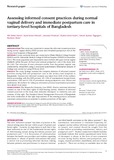Assessing informed consent practices during normal vaginal delivery and immediate postpartum care in tertiary-level hospitals of Bangladesh

View/Open
Date
2019-05-21Publisher
European Journal of MidwiferyAuthor
Karim, Md AbdulAhmed, Syed Imran
Ferdous, Jannatul
Islam, Bushra Zarin
Tegegne, Henok Ayalew
Aktar, Bachera
Metadata
Show full item recordCitation
Karim, M. A., Ahmed, S. I., Ferdous, J., Islam, B. Z., Tegegne, H. A., Aktar, B. (2019). Assessing informed consent practices during normal vaginal delivery and immediate postpartum care in tertiary-level hospitals of Bangladesh. European Journal of Midwifery, 3(May). https://doi.org/10.18332/ejm/109311Abstract
INTRODUCTION This study was conducted to assess the informed consent practices
during normal vaginal delivery (NVD) process and immediate postpartum care in the
tertiary-level hospitals of Bangladesh.
METHODS A cross-sectional study was conducted at Dhaka Medical College Hospital
(DMCH) and Sir Salimullah Medical College & Mitford Hospital (SSMCH) in November
2015. The study population and respondents were mothers who gave normal vaginal
childbirth within the past 24 hours and received postpartum care in the study sites
(N=190). The interview of every alternate mother from the patient register was
conducted by researchers using a structured questionnaire. Descriptive analysis of
findings was carried out using MS Excel 2013.
RESULTS The study findings revealed the complete absence of informed consent
practices during NVD and postpartum care in the tertiary-level hospitals in
Bangladesh. Consent (not informed consent) was taken from 95% of the mothers
before proceeding with the NVD process, 50–72% of examinations (except breast
examination, 0%) and 8–72% of procedures during postpartum care. Choice and
preferences of mothers for taking an alternative process/examination/procedure
were absent in all cases.
CONCLUSIONS The Respectful Maternity Care (RMC) Charter endorsed informed
consent as one of the basic rights of child-bearing women. Absence of informed
consent practices in the study sites indicates disrespect to maternity care and
violation of this right. The Standard Clinical Management Protocols of Bangladesh
also lacks clarification of this right. Improvement of the existing protocol, increased
awareness and practices are essential to address protection of this right.
